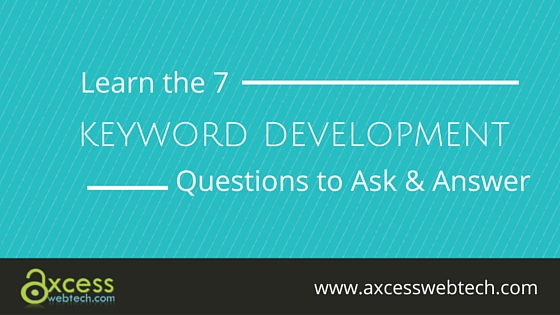|
Keywords are an important aspect of website success. Choose them wisely. Research them carefully. Position them strategically. When you’ve taken the steps to plan and implement a keyword development strategy, you’re on your way to a website that sells. Here are seven questions to ask yourself as you’re creating and implementing your plan.
Question #1 What keywords and keyword phrases does your target audience use to find information? Your audience and prospects are looking for your information. Your job is to determine what keywords they’re using to look for you. Once you’ve uncovered the low supply high demand keywords, you can position them strategically in your content and on your website.
1 Comment
Your landing page is important. Quite often it’s the page that most visitors come to first. It’s the page you may generate links to. It may also be the page that the search engines pay the most attention to. Therefore, it makes sense to make sure your landing page is as well designed as it can be.
There are seven key elements for a successful landing page. They each are important independently, but they work together to provide a unique and effective experience. Before you take a look at these key elements, however, it’s important to answer a question first. What is the goal of your landing page? Your landing page needs to have a goal - an objective. What do you want visitors to do? What action do you want them to take? There are many possibilities. You may want them to: * Dig deeper and explore your website * Click through to a sales page * Opt-in 12/15/2015 1 Comment Optimize Your Website Through TestingTesting is one of the most overlooked business tasks. Without testing, you cannot know what tactics and actions are most profitable. Testing tells you which headline works best. It tells you which ad delivers targeted traffic. Testing tells you what your prospect’s priorities are. It tells you where to place you most important information on your website. In fact, testing can tell you just about anything you want to know.
The great news is that there are some truly amazing tools and services. They enable you to test many things before you implement them. You can also test your competitors’ sites using these same tools. This means you can learn what they do well and where you can improve. Search engines matter. They send traffic to your website. Use them well and they send very targeted traffic to your website. Targeted traffic turns into customers and repeat visitors. This means it’s not only where you're placed on the search engine rankings, but the keywords you use as well. You want to make sure you’re attracting targeted traffic to your site.
The world of search engine optimization and keyword development can feel overwhelming. It seems there’s a lot of information to learn, know and use. However, when you drill down, it’s actually quite simple. You want to optimize your website for a few primary keywords. These keywords ideally will have an acceptable amount of demand and supply. They’ll also be keywords that your audience is likely to use to find your information. Then you optimize your pages for those keywords. You also choose some secondary keywords to support the primary ones. These may be keywords with less demand and less supply. However, they’re still keywords your audience is using to find your information. How do you use these keywords? Content, content, content. Content gives the search engine spiders something to index. It also provides material that others may link to. This is an important part of SEO. What are your website goals? Do you have any? Presumably you want to make money, but how? Does each page on your site have a goal? If so, does the goal of the page also support your ultimate website goal?
Your website goals might include: * To sell a product * To sell a service * To motivate an opt-in * To inspire a visitor to click on an affiliate advertisement * To provide information and receive ad exposure and PPC income Any single website page may also have these same goals. They may also be designed to help you achieve other independent goals. For example, one web page may be designed to promote your opt-in offer. In addition to your call to action, there are other things you can do. |
AuthorJulie Herndon Archives
January 2021
CategoriesAll Competition Digital Marketing Google Mobile Online Marketing SEO Social Media Website Website Wednesday |
|
Contact Us
Tuscaloosa, AL 35407
Office: (205) 242-1742 Fax: (205) 737-7034 |
Locally Owned and Operated
|
What Our Customers Say...
|
Copyright 2004 - 2024 Axcess Web Technologies | All Rights Reserved | Privacy Policy
Website by Axcess Web Technologies
Website by Axcess Web Technologies






 RSS Feed
RSS Feed
